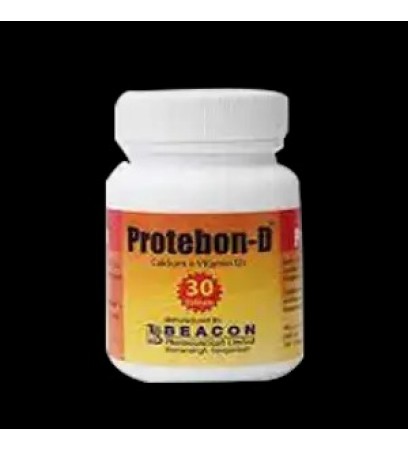Protebon-D Tablet
- Brand:Beacon Pharmaceuticals Ltd
- Product Code: Calcium Carbonate [Elemental] 500mgVitamin D3 200IU
- Availability: In Stock
-
199.50Tk.
Indications of Protebon-D Tablet
This combination is used for treatment of osteoporosis, osteomalacia, rickets, tetany and in parathyroid disease. Calcium supplements are often used to ensure adequate dietary intake in conditions such as pregnancy & lactation, osteogenesis and tooth formation (adjunct with definite treatment) and therapy with anti-seizure medications. It is also used as routine supplement and phosphate binder in chronic renal failure.
Pharmacology of Protebon-D Tablet
When calcium carbonate reacts with gastric acid, a salt and water are formed. The proposed chemical reaction for calcium carbonate is CaCO3 + 2HCl = CaCl2 + H2O + CO2.
Two grams of calcium carbonate are enough to raise the pH of 100 mL of hydrochloric acid to above 6. The activity of pepsin in gastric secretion is reduced as the pH of the stomach rises. Up to 30% of the calcium load consumed orally may be absorbed.
Administration & Dosage of Protebon-D Tablet
Calcium 500 mg and Vitamin D3 200 IU Tablet: 2 tablets daily or 1 tablet twice daily. It is best taken with or just after a meal to improve absorption.
Calcium 500 mg and Vitamin D3 400 IU Tablet: 1 tablet twice daily. It is best taken with or just after a meal to improve absorption.
Interaction of Protebon-D Tablet
If systemic hypercalcaemia occurs, calcium carbonate may enhance the cardiac effects of digoxin and other cardiac glycosides. When Calcium Carbonate is used as the primary phosphate binder, it may interfere with the absorption of concomitantly administered tetracycline preparations, and in chronic renal failure, vitamin D therapy may need to be modified to avoid hypercalcaemia.
Contraindications
When hypercalcaemia occurs, stopping the drug usually suffices to bring serum calcium levels back to normal. In patients with sarcoidosis, renal or cardiac disease, or those taking cardiac glycosides, calcium salts should be used with caution.
Side Effect of Protebon-D Tablet
Calcium carbonate taken orally can irritate the gastrointestinal tract. It's also possible that it'll make you constipated. Hypercalcemia is rarely caused by calcium alone, but it can happen when large doses of calcium are given to patients with chronic renal failure.
Pregnancy & Lactation
Oral calcium supplementation or antacid therapy with calcium-containing drugs has been widely used in pregnancy. Lactating women can also benefit from calcium carbonate.
Precautions & Warnings
When hypercalcemia occurs, the drug must be stopped immediately.
Therapeutic Class
Minerals involved in bone formation, mineral preparations
Storage Conditions
Store at or below 30°C, away from light and moisture. Keep out of reach of children.
Pharmaceutical Name of Protebon-D Tablet
Generic of Protebon-D Tablet
Tags: Protebon-D Tablet

